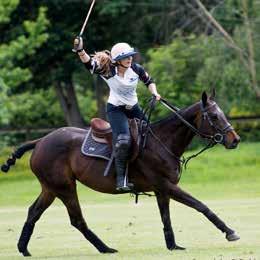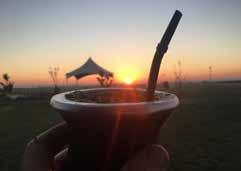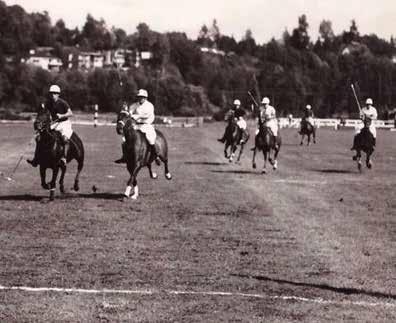
9 minute read
Vancouver Polo Club
from History of Polo
by MediaEdge
Polo has been played in Vancouver since 1913, when the original Vancouver Polo Club was established. During the 1950s and 60s, polo games were held on Sunday afternoons with a small price for admission. The polo field was originally on land that is now part of McCleery Golf Course, but in 1957, a new field was created at the Southlands Riding Club.
In 1970, the main polo group left Southlands for a larger field in Delta and it would be another 17 years before a new group formed. This group of interested members lobbied to bring polo back to Southlands Riding Club. Sunday matches resumed in 1988 and lasted for several years. A hiatus followed and no organized polo was played in Vancouver for almost two decades, until today’s Vancouver Polo Club was founded in 2011. In the initial years, the budding club consisted of just two members—Claudia and Tony Tornquist, who travelled far and wide to play polo with other clubs in the Pacific Northwest. The launch of the Pacific Polo Cup in 2014, a polo spectator event with the Southlands Riding Club that has since become an annual fixture in Vancouver’s social calendar, kick-started the growth of the Vancouver Polo Club.

Tents ready for the Pacific Polo Cup
Vancouver Polo Club
2



1

5
Membership grew as spectators turned into players. The early days saw plenty of improvisation, including hunter-jumpersturned-polo-ponies and a dozen beginners playing rather crammed games on halfacre makeshift polo fields. 2016 marked an important milestone as the Vancouver Polo Club moved to its own premises in Delta, just 20 minutes outside of Vancouver. Owned by the Sullivan and Tornquist families, the property was originally a 20-acre defunct farm. To turn it into a playable field with a clubhouse, a Facebook request was sent out asking for volunteers to lend a hand, and many responded, including existing players from the Southlands Riding Club. With this army of volunteers and a great deal of assistance from local farmers and their heavy equipment, a significant investment was made, and the field took form. But anyone who has started a polo field knows that growing grass is not always easy, especially on a field located just above sea level. The first year, the polo field was a mix of dirt and grass. By the 5th year, the field came a long way largely due to investments in irrigation and mowing equipment.

THE CLUB TODAY
The Vancouver Polo Club today remains at the Delta location. The property is on a quiet farm road that dead ends to a sandy beach known as Boundary Bay, where miles of dikes provide for a scenic option for sets, walks and bike rides. The club has one full size playing field and a small practice field. The field is
3 4


maintained by members who volunteer their time to keep it smooth and mowed, and the surrounding facilities in great shape. Only four years old now, the field is improving every year with ongoing improvements made each spring. There is a sentence on the previous page that says more or less the same as this sentence, except it says the field is five years old. I would either delete the sentence here, or change four to five.
A two-bedroom house provides accommodation for an Argentine professional and his family. In 2018, one of the club’s sponsors, AMACON Developments, donated a sales centre from one of their development projects. This 3,000 square foot building was finished to provide a three-bedroom suite for other pros and grooms, as well as a sizable clubhouse facility with a kitchen for parties and events.
Membership at the Vancouver Polo Club has grown rapidly in the five years since the new field was developed. At present there are 12 playing members and a large number of regular beginners who play in the All-Star league or take private lessons and clinics. Club chukkers are played every Tuesday, Thursday and Sunday. All-Star chukkers are typically played on Saturdays. The club boards about 40 horses per year on the property.
To encourage new members, existing members will offer their horses into a “pony pool”. This pool is to complement the few club-owned horses, and allow


6 7
for new players to take group clinics and play in All-Star games without having to invest in their own horses right away. It is common at the club for clinics of four people or more to occur several times a week. Once All-Stars are comfortable at a canter, they are rapidly moved into slow club chukkers with members. Most years, at least one All-Star is turned into a horse owner.
HORSES
In year two of the new Vancouver Polo Club, an interesting event changed the trajectory of its growth. Bobby Anderson, a thirdgeneration polo rider and horse trainer who owned Boot Ranch in Yakima, was the source of some initial ponies for a few members. In the spring of 2017, Paul Sullivan did a
8
9
weekend visit to Boot Ranch. On this visit Paul learned that Bobby’s husband Blake had been diagnosed with advanced-stage cancer and needed immediate surgery. Bobby then put out an offer to the Vancouver Polo Club members to sell them 10 horses, F350 flatbed, and a 10-horse trailer. With so many new members at VPC, and the Tornquist’s owning most of the polo horses at the time, there was serious interest. That Sunday, on return from Yakima, an emergency call was made between all the new members of the club. The following day a group of eight members chartered a jet and set off to Yakima to test ride the unshod horses, who were fresh out of winter pasture. In the two days they were there, the new members rode many
1 High-five for the crowds at Pacific Polo Cup played at the Southlands Riding Club 2 A polo clinic forming part of a corporate event at VPC 3 Sunsets and Mount Baker views make evenings stunning at the club 4 Tornquist family celebrating a win at PPC 5 Paige Sullivan celebrates a goal 6 Paul Sullivan, Grant Lockhart and Benson Hurlbut IV attending a tournament at George Dills in La Conor 7 Claudia and Tony Tornquist sharing strategies 8 Paul and Grant battle for the ball 9 Nico Lambias, one of many Argentine pros who have worked at VPC for the summer season THE SPORT OF POLO IN CANADA \ 87
Vancouver Polo Club


2 1

1 3 4

horses, and much to Bobby’s credit no one came off. Bobby and her Boot Ranch crew provided some of the best hospitality you could hope for and the VPC rolled out of Yakima horsed up for the season.
PROFESSIONALS
For the first two years, VPC operated with a single pro named Ernesto Mana Balbastro. It was a tough job when there were some 20 horses on the property and just Ernesto and a hired mucker to feed and care for them. The members all did self tacking and helped out as much as possible. The big field was freshly planted, and the club spent most weekends travelling around the Pacific Northwest playing tournaments with other clubs. The learning curve was very steep at this time, and the addiction to polo was rippling throughout the small membership.
For the past three seasons, VPC has taken on Nico Maciel as the club professional and manager. With over a dozen members and some 40+ horses on the property, Nico convinced the board to bring on two additional working professionals from Argentina, as well as grooms. The influx of talented professionals at the club have allowed for high level club chukkers and also resulted in the training of many future members. For the past couple of years, VPC has spent more weekends at their home field to build on their membership.
THE PACIFIC POLO CUP
The biggest event every year at the Vancouver Polo Club is the ‘Pacific Polo Cup’. This event is hosted in the city of Vancouver and attracts crowds upwards of 1,000 people. High-end food and beverage service, combined with VIP tents and significant sponsors, has grown this event every year. Corporate sponsors often buy cabanas and bring their office for a summer event in the sun. This has been a rich source of new members, who

6 8



5 7 9

are often several drinks brave and end up at the polo clinic to follow.
Aside from a selection of sponsors, the VPC board and members greatly value the charitable partnerships they have established over the years. Their primary charity partner is currently Canuck Place, a hospice for sick children. This hospice is located in facilities throughout the province and only accepts children under the age of 18 with acute or terminal illness. A variety of fund-raising activities form part of every event the club hosts, and the club is immensely proud of the funds they have raised over the years for their partners in society.
MEMBERS
Family is a core value at the Vancouver Polo Cub, with several families having multi generations currently playing. More often than not Sunday polo is followed by an asado for friends, family, and spectators. Vancouver is a rich multicultural city, and with VPC now on the map and a simple Google search required to find it, the club is truly fortunate to have attracted players from around the world. The growth potential is exponential in light of all the interest, and what is needed next is another field!
A selection of club members has taken the Vancouver Polo Club brand and set up winter polo in Indio, California. The season in Vancouver is June to September, so many members who want to play the winter season at Eldorado and Empire polo clubs send their horses south at the end of September. The competitive play in California has been a fantastic experience for many members, and no doubt is helping take the membership roster to a new level of play especially considering many members have only ridden/played polo for a few years, or since the start of the new club in Delta.
1 Summer walk along the dyke on Boundary Bay 2 Dexter Tornquist chilling out after a game 3 Many matte sunsets 4 Claudia working the crowds at PPC 5 Celebrating the win at West Coast Classic 6 Gary and Suzanne Warner celebrating their wedding anniversary at VPC 7 Much work to do getting 40 ponies ready to go 8 Claudia making some moves on “Paige” as they storm down the field 9 The early years of VPC playing at the Southlands Polo and Equestrian Club










